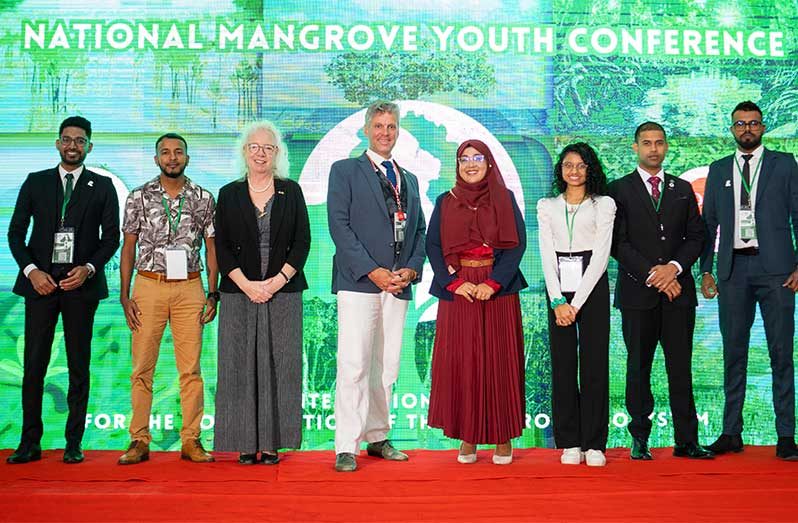RECOVER Guyana (RG) has been an advocate for the environment, and the well-being of humans through opportunities that enrich and empower lives and foster environmental stewardship and long-term resilience.
With the aim of “building a greener tomorrow,” the organisation has hosted several events targetting youths, encouraging them to contribute to the cause. Some of their most notable projects include SHOUT, ENGAGE, and the National Water Purification Project, which has helped to shape the future generations of environmental advocates.
Recently, the organisation hosted its inaugural National Youth Conference for Mangrove Conservation, in partnership with Jan De Nul, which brought together 150 youths from across Guyana, and local and international experts, policymakers and educators with the aim to highlight the vital role of mangrove ecosystems in climate action, coastal protection, and community resilience.
In his welcome remarks, the Founder of Recover Guyana, Dr. Dave Lalltoo, said the organisation remains steadfast in its commitment to scale up its impact. By 2030, Recover Guyana aims to
save over 25 million through its water-purification project, train 1,000 youths through ENGAGE, and continue its nationwide efforts in capacity-building, environmental education, and community mobilisation.
He added, “Every one of these actions is designed not just to respond to today’s threat, but to build lasting systems of protection for our people, our biodiversity and our precious mangroves.”
Meanwhile, Project Manager at Jan De Nul, Davy Spriet, said losing mangroves isn’t just an ecological problem, it is a direct threat to our safety, our food security and our future.
“This isn’t just about environmental protection, it is about empowerment. It’s your chance to be part of a movement that builds a better world, one mangrove at a time. It’s about igniting that passion within you to create lasting, positive change, not just for today, but for the true, flourishing future, where the economic value of mangroves is fully recognised and protected for all,” Spriet added.
Further, British High Commissioner to Guyana, Jane Miller, in her remarks pointed out that mangroves are the superheroes of our forests, noting that biodiversity and mangroves are being depleted around the world.
“The UK has a number of initiatives that we are implementing around the world in terms of preventing mangrove loss; and some of those are being applied here in Guyana. We have one project…we worked with the Guyana Marine Conservation Society, where we work with young women to teach them how to fly drones,” High Commissioner Miller said, explaining that these drones are used to monitor either increases or decreases in mangroves along the coastland.
She added that they are also working alongside the Inter-American Development Bank (IDB) in the Barima-Mora Passage to support local efforts, and the Global Green Initiative (GGI).
The High Commissioner advised that youths gain knowledge about the importance of mangroves and to become advocates for change and mangrove conservation and protection.
“There are things that you can do. Positive action that you can do. But the first thing for you to do is to recognise the importance of mangroves, increase your awareness, increasing your knowledge and then you can work with others,” High Commissioner Miller stated.
The conservation, according to Recover Guyana, marked a significant step toward a more informed, resilient, and youth-empowered approach to environmental protection in Guyana.
Alongside its partners, Recover Guyana continues to lead national initiatives in green entrepreneurship, community outreach, and sustainability-focused training. These programmes address some of Guyana’s most urgent development challenges, including food security, pollution, and access to clean water, while also equipping young people with the tools to become active stewards of Guyana’s natural resources.
To see more from Recover Guyana, persons can visit and follow the organisation on Facebook, where updates are shared regularly.



.jpg)








